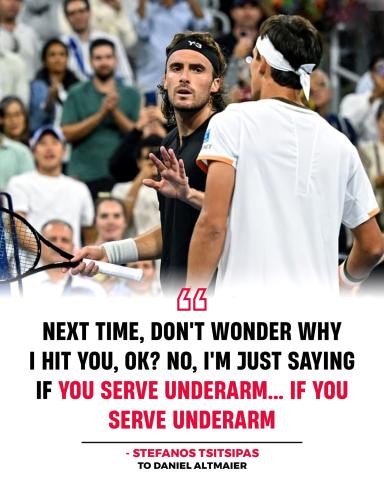
The US Open is never just about forehands and backhands; it's a theater of human competition where emotions, strategy, and psychology collide. In a tense second-round night match on Court 17, that collision was on full display as Stefanos Tsitsipas narrowly defeated Germany's Daniel Altmaier 5-7, 6-4, 6-3, 4-6, 7-6(6). But the story wasn't just the score—it was a fiery exchange over an underarm serve that revealed the thin line between innovation and insult in modern tennis.
The Incident: A Spark in the Fifth Set
With the match deadlocked in a grueling fifth set, Altmaier, known for his gritty defensive game, decided to break the rhythm. At a crucial moment, he deployed an underarm serve—a tactic increasingly used by players like Nick Kyrgios and even Tsitsipas himself to disrupt an opponent's deep return position.
Tsitsipas, positioned far behind the baseline, scrambled forward but could only dump his return into the net. Visibly irritated, the Greek star didn't just seethe silently. As the players changed ends, a heated verbal exchange ensued. The microphone picked up Tsitsipas's sharp warning:
"Next time, don't wonder why I hit you!"
The comment immediately sent ripples through the tennis world, raising questions about etiquette, respect, and the unwritten rules of the game.
Expert Analysis: Gamesmanship or Legitimate Tactic?
We turned to a panel of former pros and sports psychologists to break down the incident.
Dr. Eleanor Vance, Sports Psychologist: "This is a classic case of perceived disrespect versus strategic innovation. For Tsitsipas, the underarm serve at that moment likely felt like a 'cheap' trick, a sign that Altmaier didn't believe he could win the point through conventional means. It attacks the ego. Altmaier, however, was simply using every tool at his disposal. Tsitsipas's threat, while likely spoken in the heat of exhaustion, reveals a deeper psychological vulnerability to gamesmanship."
Mark Petchey, Tennis Analyst & Former Coach: "Let's be clear: the underarm serve is a legal shot. Full stop. It's a smart play against someone returning from the parking lot. However, the delivery matters. If it's done with a smirk or perceived arrogance, it can be inflammatory. Tsitsipas's reaction, though unacceptable in its wording, is a testament to the immense pressure these athletes are under. It was a release valve for hours of frustration."
The Verdict: The experts agree that while Altmaier's play was tactically astute, its timing in a pressure-cooker fifth set made it a potent psychological weapon. Tsitsipas's reaction, though extreme, was a raw response to that mental provocation, highlighting the intense mind games at play in a best-of-five match.
Thinks to Remember After the Game
This incident offers several key takeaways for players and fans alike:
-
The Rules vs. The "Code": Tennis has a rulebook, but it also has an unwritten code of conduct. Shots like the underarm serve, the moonball, or hitting directly at the net player live in a gray area. They are legal but can be seen as violating the spirit of respectful competition.
-
Emotional Control is a Skill: The difference between winning and losing at the highest level often comes down to who manages their emotional energy better. Tsitsipas's comment, though he won the match, showed a momentary loss of that control that could have cost him dearly.
-
Everything is a Strategy: Altmaier’s serve was not just a shot; it was a message. It was designed to get into Tsitsipas's head and break his rhythm. It worked, perhaps too well, but it ultimately shifted the momentum in a subtle way.
-
Context is Everything: An underarm serve in the first set is a surprise. An underarm serve in a fifth-set tiebreak is a declaration of war. Understanding the match's narrative is key to understanding the reaction it provokes.
Analysis of the Game: A Battle of Will
Beyond the controversy, the match itself was a spectacular display of resilience. Altmaier, the underdog, pushed Tsitsipas to the absolute brink with his relentless defense and fearless shot-making. Tsitsipas, however, relied on his bigger serve and forehand to create fleeting opportunities. His ability to win the final-set tiebreak, despite the emotional turmoil, speaks to his growth as a competitor. He channeled the anger into focus when it mattered most.
The victory was a testament to survival, not domination. For Tsitsipas to make a deep run in this US Open, he must harness that fire without letting it burn out of control. The incident with Altmaier wasn't just a sidebar; it was the core of a match that tested skill, nerve, and the very nature of tennis sportsmanship. It serves as a gripping reminder that in the gladiatorial arena of a Grand Slam, every shot carries weight, and every word can become a headline.
